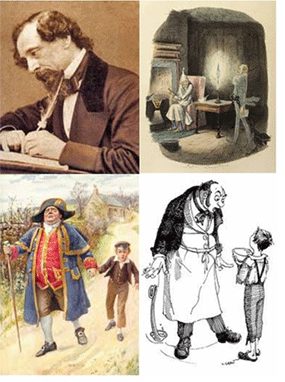Meanings of LIVE and LIFE – plus, Dickens’ 200th birthday
 Hello, I’m Jane at DailyStep English and welcome to my audio blog.
Hello, I’m Jane at DailyStep English and welcome to my audio blog.
.
It’s 200 years since the birth of Charles Dickens, one of the most famous British novelists. In this blog, I’ll tell you a little about him. You’ll also learn the difference between LIVE, LIFE and LIVE – three very similar words. There is also an audio description of the lessons coming soon on DailyStep, and a great audio quotation from Charles Dickens.
.
If you are new to DailyStep.com and you would like to be on my mailing list, and also have 5 free audio lessons, please register here. You can see a video of how to use a beginner level lesson at the bottom of this page. If you have any questions about my lessons, please email me at jane@dailystep.com
. .
So, let’s start a look at Charles Dickens!
To download this premium audio, please subscribe to DailyStep English Audio Lessons. This will give you 5 Audio Lessons per week, plus full access to hear and download all DailyStep blogs.
Charles Dickens
by Jane Lawson at DailyStep.com
.

Dickens is one of the most famous authors in the English language. If you study English literature, you will most certainly cover his works. This month we are celebrating 200 years since his birth, on 7th February 1812. He lived until 1870, and was considered to be the greatest author of the Victorian age – that is, the time from 1837-1901 when Queen Victoria was on the throne.
.
The Victorian age was one of great prosperity and industry for Britain, but it was also a time of extreme poverty and deprivation. Dickens had a strong social conscience and in his novels he drew attention to the living conditions of some of the poorest people. In one of his most famous stories, Oliver Twist, the main character is an orphan who starts off living in a workhouse, then moves from one miserable situation to another as he becomes a thief in London. You can tell that Dickens has real compassion for the boy and his life, and as you can see in the two bottom illustrations, the people who exploited him are always shown as pompous and very well fed, whereas poor Oliver is thin and frightened.
.
Some of the characters in Dickens’ novels are so famous that we still use their names to describe people. In ‘A Christmas Carol’ about a miserly man who is never generous, the main character’s name is ‘Ebenezer Scrooge’ – and we still use the word ‘Scrooge’ to describe mean people. For example, we might say ‘He’s such a scrooge! He never buys anyone a drink or a birthday present.’ Fortunately, in the story, Scrooge completely changes his outlook after being visited by a series of ghosts, who show him visions of the past, present and future. You can see an illustration of Scrooge and one of the ghosts in the top right hand picture.
.
I can’t possibly tell you enough about Charles Dickens in this short blog post, but I hope you will try to read his books – preferably in English! Now let’s move on to our Audio Word Study, where I’m going to explain the difference between LIVE, LIFE and LIVE.
Here is Audio Word Study #044 from Jane Lawson at DailyStep.com
.
LIVE, LIFE and LIVE.
Thank you to Waldemar from Poland for requesting an explanation of how to use these words. I think the use of LIVE as an adjective and adverb is the part that causes most confusion – but see what you think!
.
LIVE (verb)
Meaning 1: to have life, or to be alive, or stay alive
Examples: 1. It is amazing that she lived after being in such a serious car accident. (note: she could easily have died after this accident.)
He lived to be 100 and got a telegram from the Queen! (note: the Queen sends all 100 year olds a telegram on their 100th birthday.)
I don’t know how he manages to live on such a small income. (note:this means that I don’t know how he pays for food, accommodation etc.)
.
Meaning 2: to have an interesting life
Examples: 1. If you have never seen the sun rise, you haven’t lived!
2. He just wants to live a bit before getting a serious job.
.
Meaning 3: to have your home or place somewhere.
Examples: 1. I live in London – where do you live?
2. He lives with his wife and children.
3. Where do the tea cups live in this kitchen?
.
LIVE (adjective or adverb)
Note: Here, the pronunciation is different, with a long /ai/ sound.
Meaning 1: If a performance is live, it is seen or broadcast while it is actually happening.
Examples: 1. Have you seen any good live bands recently? (note:this means, ‘Have you been to any good performances by bands playing music recently?’)
2. I can’t believe you saw the Rolling Stones playing live! (note: This person saw a live Rolling Stones gig. Here, live is an adverb, describing the verb ‘playing’.)
3. The Royal Wedding was broadcast live to around 3 billion people worldwide.
.
Meaning 2: charged with electricity, or able to explode or burn.
Examples: 1. Be careful with that wire – it is live and you could get an electric shock!
2. The army used live ammunition even though it was just a training exercise.
.
LIFE (noun)
Note: The plural of this is LIVES
Meaning: The period between birth and death, or the experience or state of being alive.
Examples: 1. He lived his whole life in the same house.
2. Life’s too short to worry about such trivial things!
3. They lost their lives in a terrible accident. (note: this is a less direct way of saying that they died. )
4. He was sent to prison for life.
5. Football is his life! He is mad on it. (note: this means, ‘Football is the best thing in his life. He lives for football. He is crazy about football.)
.
Now, try to write your own sentences using LIVE, LIVE and LIFE. Make sure these sentences are true to your own life because this will help you to remember them better. That is all for Audio Word Study #044 on DailyStep.com.
Here is Famous Quotation #001 from Jane Lawson at DailyStep.com.
. .
“Any man may be in good spirits and good temper when he’s well dressed. There ain’t much credit in that.”
Source: This quote is from the novel Martin Chuzzlewit by Charles Dickens.
Meaning: It is easy to be happy and good to others when your life is comfortable. But can you be the same when your life is not?
Note: “There ain’t” is an informal way of saying, “There isn’t”. Ain’t can also mean “am not”, “are not”, “have not” and “has not”. It is particularly commonly used with some accent groups such as cockney and American.
What is a DailyStep English Audio Lesson?
More English Courses
I also produce IELTS and other exam courses, and other courses where you can learn English through literature, drama, comedy, history, natural conversation and more!
more | plus | más | altro | 続き | 자세히
Well, that is it for today! I’ll be in touch again soon. Thank you for your many requests about subjects you would like me to cover in my blogs. I will cover as many of them as I can!
How does a DailyStep subscription work?
.
DailyStep Audio lessons make you speak English like a native speaker for a short time each day, and help you to understand native speakers perfectly.
.
If you subscribe to my regular DailyStep audio lessons, I will send you 5 expertly- designed audio lessons per week, so every month you get approximately 22 lessons per level. You choose the level yourself that you think will be challenging for you – not too easy, not too hard – and you can change your level, or add more levels, at any time after joining.
- Each weekday (Monday to Friday), you receive an email containing a link that takes you straight to your audio lesson.
- Each audio lesson contains a short conversation, with an audio file and script, as well as vocabulary and style notes to help you understand it.
- Key phrases in the conversation are hidden at first so you can test your listening skills. You can then uncover the hidden text.
- There are 2 audio files per lesson – one at fast, natural speed and a second audio file that is slowed down using special software to 65% of natural speed. This allows you to hear exactly how the language works.
- You copy the native speakers by speaking along with the audio files to improve your pronunciation, rhythm, speed and intonation.
- All your lessons are stored for you in an online Personal Lesson Bank so you can log in to take them again any time, or take lessons you have missed – even after your subscription has expired!
- You can download the MP3 audio files to your computer, mobile phone or i-pod.
- The lessons take only 5 – 10 minutes each day to complete, and you can log in and take your lessons from any computer.
- There are no advertisements to distract your attention.
.
As a subscriber, you will also get full access and download rights to the audio in my Teacher’s Blogs, with cultural articles and downloadable audio grammar lessons.
.
DailyStep Audio Lessons are exceptionally good value – I believe in keeping prices down so that better English is affordable for everyone! There is a 30-day money back guarantee, so there is no risk at all! So what are you waiting for? A journey of a thousand miles begins with a single step!




